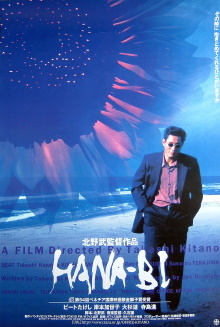Years after watching Sonatine, here we finally get around to Hana-bi which is arguably director Takeshi Kitano’s magnum opus. This one has many of the same thematic elements as the earlier film including the director himself playing a jaded, violent character but is far more refined and coherent. Featuring music by Joe Hisaishi and artwork by the director himself, it leans fully into the anime aesthetic to fantastic effect.
Nishi is a police detective who loses his job after a confrontation with a gangster leads to one of the death of one of the officers under him and another one paralyzed. The paralyzed officer Horibe has his wife and child leave him and feeling useless, contemplates suicide. Meanwhile Nishi also has more personal problems in that his wife has been diagnosed with terminal leukemia and he owes money to the yakuza. Though he brutalizes the yakuza members whenever they show up, they persist in chasing after him for the money. Eventually he buys a stolen taxi from a junkyard, repaints it to look like a police car and even equips it with a police siren in order to rob a bank. He uses this money to buy painting supplies for Horibe, pay off the yakuza and take his wife on one last holiday trip to make her happy.
The plot for this one is straightforward and simple, despite a small amount of confusion at the beginning due to how the fight that causes Nishi to lose his job is told as in flashback. The beauty of this piece is entirely on the aesthetics of its execution. Nishi is taciturn and tends to speak with his fists, yet is clearly loving to his wife and sympathetic to his police colleagues. Nishi frankly tells the junkyard owner that he is going to rob a bank and the owner reacts with delighted amusement. Meanwhile the Hisaishi music and the pointillist paintings that Horibe eventually starts making, in actuality made by Takeshi himself of course, juxtapose an anime sensibility with the absurdist cynicism and gory violence that the director seems to favor. The paintings in particular are amazing and give tremendous expressive power to all of the feelings that thoughts that the character Nishi does not have to say out loud. The result is a very appealing and memorable film that amounts to a kind of visual poetry, which is probably why critics loved it but called it unclassifiable.
All the same, it would be easy to read too much into this. I dislike for example how Nishi’s wife is never developed as a real character at all and as such has no dialogue. She is there simply to provide motivation for Nishi. Similarly it gets silly how the yakuza are simply his punching bags, showing up again and again to demand money when they just know that they will get beaten up. As I’ve noted, this is very much a film that operates on anime logic, albeit one with a dark bent, and you need to be watch it under that mindset. Still, there is no question that this is a wonderful film that showcases an incredibly talented and creative mind. It is worth noting for example that Kitano himself originally learned painting while he was recovering from a motorcycle accident and he acts with such minimal emoting because his facial muscles were paralyzed from that accident. It is therefore very impressive how he turned those personal setbacks into strengths in his creative endeavors. All around an entertaining and easy to watch film that makes for an easy recommendation.
